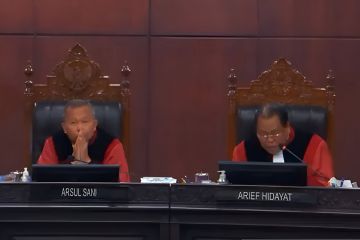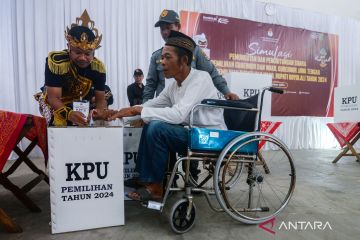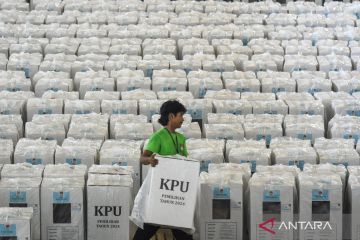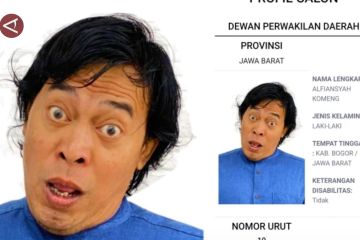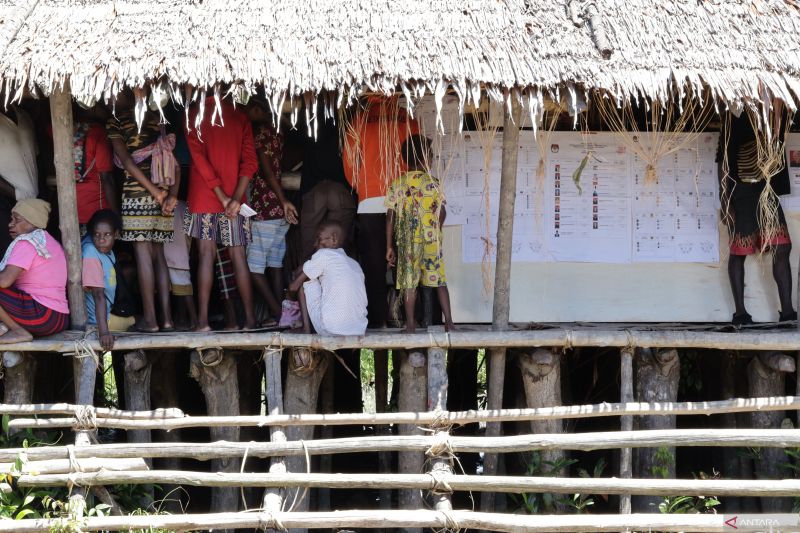
This year's general election marked the second time that people from Asmat district, South Papua province, fulfilled their right to vote through the one-person-one-vote mechanism implemented nationally.
Earlier, people from the district, nicknamed the "City of a Thousand Boards," elected their leaders through the Noken system, or a consensus conducted by indigenous elders based on local customary values, traditions, culture, and wisdom. The noken was replaced by the ballot box on Election Day, February 14, 2024.
However, the indigenous people and migrants in Asmat were enthusiastic about coming to polling stations (TPS) to cast their vote. Several polling stations were located in the Bujang traditional house in Asuwetsy village, Agats, Asmat district.
Inside the rectangular traditional house, five polling stations were set up to serve 1,675 voters. To uphold the principle of direct, general, free, secret, honest, and fair polling, the polling stations were separated by partitions.
At 6:30 a.m. local time on February 14, the Samat indigenous people who were eligible to vote and were registered in the permanent voter list (DPT) flocked to the traditional house located near the estuary.
People arriving at the TPS at Bujang House were full of enthusiasm and excitement. Some of them were even game to watch the activities at the TPS under the hot sun while waiting for their turn to vote in the once-in-five-year election.
As they waited for their name to be called out by officers of the election organizing team (KPPS), the residents sat patiently in front of Bujang House.
A display of sample ballots on the walls, the list of election candidates' names, their sequence numbers, the political parties supporting them, and information about the presidential and vice presidential candidate pairs also vied for the residents' attention.
The voters scrutinized the names on display before entering the voting booth to make their choice.
Meanwhile, the presidential and vice presidential sample ballot pasted on the wall was made particularly large.
Residents looked closely at the photos of the number 1 candidate pair Anies Baswedan-Muhaimin Iskandar, number 2 pair Prabowo Subianto-Gibran Rakabuming Raka, and number 3 pair Ganjar Pranowo-Mahfud MD before making their choice.
People's hope
For the people of Asmat and Papua in general, the election was a long-awaited ritual of democracy.
On voting day, they cast their votes, pinning their hopes on their preferred candidates, especially the president and vice president.
Robi, 45, who belongs to the Asmat tribe and has participated in the election several times, said that almost all people in the district have high hopes from the candidates, especially those vying to be the head of state.
Health, education, people's prosperity, decent living, and clean water are the Asmat tribe's main hopes, he expounded.
People from Asmat district are not demanding much. They dream of being able to enjoy their daily lives, just like people from other provinces.
While waiting for a call from the KPPS team, Robi said that he had the presidential candidate pair he would vote for in mind, but he did not disclose the pair's identity.
He expressed the hope that the next president will protect all children of the nation and pay more attention to the people in the Land of Papua.
His hopes have been further raised on account of two legislative candidates from his hometown running in the 2024 elections. Robi and the other residents are also expecting that the two candidates will fight for the Asmat people's aspirations if they win.
An elder belonging to the Asmat customary consultative body, Nicolaus Ndepi, said that the next president and vice president must not just be smart and capable, but must be polite in speech and have a loving heart.
Ndepi said that figures with such characteristics would find favor with the Asmat people.
He also wished that the next government would form a Ministry of Indigenous Affairs.
According to him, if such a ministry is formed, several problems related to customary affairs and traditions in the country could be resolved quickly.
"All kinds of dreams and aspirations can be born from tradition. It must be known that customs go first, then religion, and then the government," he said.
Noken system
Ndepi informed that the Noken system was once prevalent in the society, but it is no longer practiced.
For the local community, the system was a deliberation process. To build consensus, indigenous elders would gather and discuss the potential candidates.
The elders never forced someone to vote for a particular candidate, as the locals prioritized democracy.
However, the locals have not rejected the national electoral system or the one-person one-vote system.
He said that the Noken system was abandoned following the Constitutional Court's decision, which was based on a mature and in-depth study.
Related news: Papua to dispense with noken system in upcoming elections
Editor: Rahmad Nasution
Copyright © ANTARA 2024






